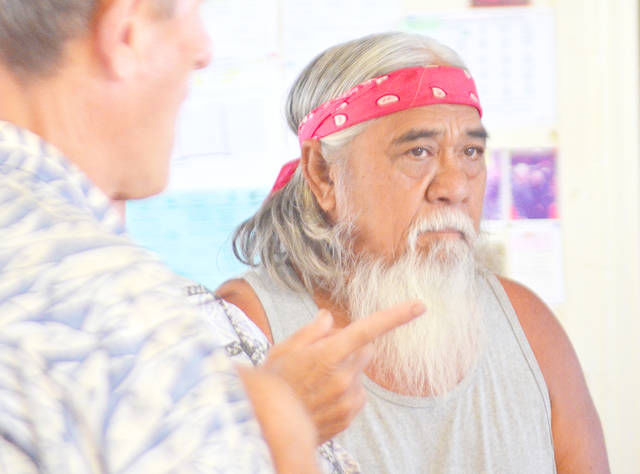WAIMEA — Harold Vidinha came to Tuesday’s meeting at Waimea Neighborhood Center with questions regarding the rat infestation on Lehua Island and the state’s plan to eradicate the rodents. But he said he didn’t get definitive answers. “I’m concerned about
WAIMEA — Harold Vidinha came to Tuesday’s meeting at Waimea Neighborhood Center with questions regarding the rat infestation on Lehua Island and the state’s plan to eradicate the rodents.
But he said he didn’t get definitive answers.
“I’m concerned about the crabs, the fish and the animals because it’s right next door to Niihau,” he said. “They rely so much on the ocean for food. It’s maybe 300 yards from Niihau to Lehua. If there’s wash-off, the poison that goes in the ocean will just go toward Niihau.”
Vidinha fishes near the shores of Lehua and Niihau. His fishing partner told Vidinha that in addition to rats, Lehua has rabbits. But when Vidinha asked the state Department of Land and Natural Resources about it, he was told rabbits were eradicated from the island in 2005.
That statement left Vidinha questioning how they can say that with certainty.
“I don’t buy that they were able to go to Lehua and shoot every rabbit and know for sure that there aren’t any left,” he added.
Now, DLNR is hoping that by dropping rodenticide on the island this summer, the extermination of rats will follow. How they will know every rat is killed is a question Vidinha wants answered.
“The ultimate goal here is to get rats off the island so that native birds can safely produce so we can see a large return in Hawaii’s native bird population,” said Josh Atwood, DLNR invasive species coordinator, to about 15 people at the meeting.
Atwood said they will be dropping the rodenticide during the summer instead of the winter, which they did in 2009.
“What likely resulted several years ago was that there was a lot of plant growth on the island so the rats had plenty of choices of what to eat, and they wouldn’t chose to eat the rodenticide,” Atwood said. “The proposed project this time around is to drop it when there is low plant growth during the summer and while there are fewer seabirds on the island to minimize impact to them as well.”
Atwood also said, unlike several years ago, there will be follow-up sweeps to ensure all rats are dead.
Several people at the meeting expressed concerns about the potential impacts the poison could have on marine life if it reaches the ocean. State officials said the rodenticide dissipates quickly and would not present a danger to anything other than rats.
Atwood didn’t have an estimate of how many rats are on Lehua, but said they are “widespread.”
Vidinha said he’ll take a look for himself.
“I have my own boat and I like to fish around Niihau and I want to see what it looks like in the water when they do start dropping the rodenticide,” he said. “I want to check it out for myself. I know the birds are there, but I haven’t seen any rats from my boat when I’m fishing.”
Galen Reid, a predator control specialist who attended the meeting, said DLNR has to think about the greater good.
“Are we going to save potentially thousands of seabirds from rats and are we going to have some short-term losses? Are we going to keep trying to do this, or are we just going to give in?” Reid said. “This is a huge deal for the future of how we’re going to deal with handling invasive species.”
The environmental assesment draft is available for open comment until April 7.



